chapter 3(1) 词语的翻译
- 格式:ppt
- 大小:755.50 KB
- 文档页数:49


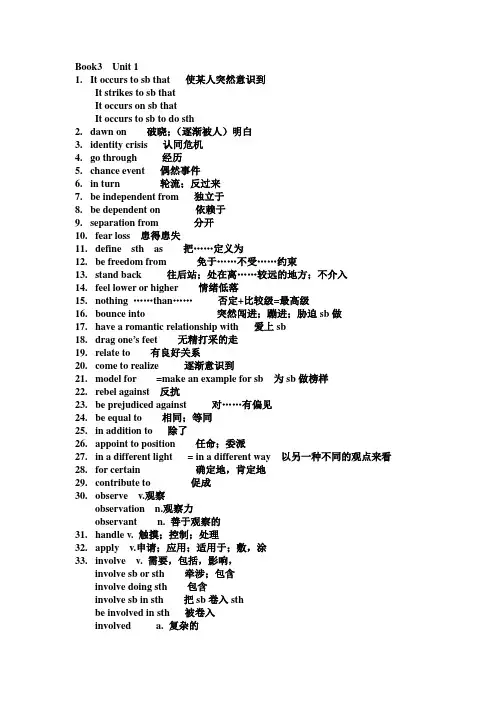
Book3 Unit 11.It occurs to sb that 使某人突然意识到It strikes to sb thatIt occurs on sb thatIt occurs to sb to do sth2.dawn on 破晓;(逐渐被人)明白3.identity crisis 认同危机4.go through 经历5.chance event 偶然事件6.in turn 轮流;反过来7.be independent from 独立于8.be dependent on 依赖于9.separation from 分开10.fear loss 患得患失11.define sth as 把……定义为12.be freedom from 免于……不受……约束13.stand back 往后站;处在离……较远的地方;不介入14.feel lower or higher 情绪低落15.nothing ……than……否定+比较级=最高级16.bounce into 突然闯进;蹦进;胁迫sb做17.have a romantic relationship with 爱上sb18.drag one’s feet 无精打采的走19.relate to 有良好关系e to realize 逐渐意识到21.model for =make an example for sb 为sb做榜样22.rebel against 反抗23.be prejudiced against 对……有偏见24.be equal to 相同;等同25.in addition to 除了26.appoint to position 任命;委派27.in a different light = in a different way 以另一种不同的观点来看28.for certain 确定地,肯定地29.contribute to 促成30.observe v.观察observation n.观察力observant n. 善于观察的31.handle v. 触摸;控制;处理32.apply v.申请;应用;适用于;敷,涂33.involve v. 需要,包括,影响,involve sb or sth 牵涉;包含involve doing sth 包含involve sb in sth 把sb卷入sthbe involved in sth 被卷入involved a. 复杂的involvement n. 牵扯;财政困难34.border issue n. 边境问题35.settle dispute 解决争端36.transport gas from sth 传输气体37.see to it 处理;照顾38.critical condition 危险期39.leave it aside 搁置;不考虑leave sb/sth behind 未能/忘记带…leave off 停止leave sth. off 不再穿某物leave it out 忽略;不提及leave sth over 推迟某事40.look at = look into 调查look up 仰视;改善look sth up 查阅(字典,参考书中)look sb up 看望或接触sblook ahead 计划未来look down upon 瞧不起look upon …as 把……视为41.set to 开始精力充沛的做sthset about doing 开始做sthset out to do 开始做sthset out sth 陈述sth42.sent out 派遣43.be content with 知足的44.be free from 摆脱45.interact with 与……相互作用Translation1.她打算申请那个学术工作。

朗文3B Chapter3(1) Campingi.Words and phrases1.stay in a tent呆在家stay _________ _________呆在学校________ ________ _________2.cook a meal做午饭________ ________煮面条________ ________3.play hide-and-seek踢足球________ ________玩球________ ________4.boil water5.pick up rubbish捡起这本书pick up ________ ________捡起它pick ________ up捡起他们_____________________6.wash outside7.plant trees种花plant _________8.make a fire with banana leaves一片香蕉叶a banana _________生火________________________9.find more firewoodfind a book ________________look for a book __________________10.help to prepare lunch帮忙找盘子help _________ _________ ________ plates11.cook the noodles12.open the tin of pork一听 a _________ _______两听可乐two _________ _________ cola13.take out14.a strong winda heavy rain15.blow away16.taste yummy尝起来很好taste _________ii.Sentences1.Was camp fun? Yes, it was.2.We stayed in a tent.3.What did you do? We cooked a meal.4.There’s not enough firewood for tonight.5.What a lot of firewood!6.Judy and Dad bring a lot of firewood back to the camp.iii.Grammar1.Be动词过去式is-was are-were句型转换:肯定句:It was great fun.There were many books yesterday.否定句:It _________ great fun.There ________ many books yesterday.一般疑问句:_________ it great fun?________ there many books yesterday?练习:①It was rained yesterday.________________________________________________________②We were happy last summer holiday.________________________________________________________2.实义动词过去式stay-stayed cook-cooked句型转换:We cooked a meal.否定(借助助动词did+not,原来动词要还原)We cooked a meal. →We didn’t cook a meal.He stayed at home last Sunday. →一般疑问句(借助助动词did提前,原来动词还原)We cooked a meal. →Did you cook a meal? Yes, we did. No, we didn’t. He stayed at home last Sunday. →练习:①I looked for my books yesterday. (改为否定句和一般疑问句)________________________________________________________________________________________________________________②He started reading when he was five. (改为一般疑问句并作否定回答)________________________________________________________③Mr Green stopped talking just now. (对画线部分提问)________________________________________________________3.感叹句What +How +There are a lot of firewood.→What a lot of fire wood!The dog is very cute.→What a cute dog!→How cute the dog is!练习:She is a beautiful girl. (改为感叹句)____________________________________________________________4.with①和play with friends②用make a fire with banana leaves5.bring sb. sth = bring sth to sb./sp.Dad brings some firewood to the camp. =My mum brings me some presents. =这样句型结构还有:6.顺序词First Next Then Finally7.windwind 风(不可数)a strong wind 一阵大风rain 雨水(不可数)a heavy rain 一场大雨8.What shall we do now?shall为情态动词+ 动词原形Shall we go?Shall I use your pen?Shall用于第一人称9.taste +形容词(尝起来…)look +形容词(看起来)The food taste good.Your friend looks nice.Exercise1.What did you do? We __________(look) for our books.2.I __________(cook) fish yesterday.3.He __________(be) short ten years old.4.We __________(plant) trees on the 21st of January.5.Please __________(pick) up rubbish.6.__________ you happy last winter holiday? Yes, I __________.7.Beeno __________(be) little when he __________(be) a child.8.What __________ he __________(play) with last night?He __________(play) with his toys.9.I cooked the noodles and the vegetables. (改为否定句和一般疑问句)________________________________________________________________________________________________________________________10.Mum only open the tin of pork. (对画线部分提问)____________________________________________________________11.Where did you collected it? (改错)____________________________________________________________12.Judy bring a lot of firewood back to the camp. (改错)____________________________________________________________13.Mark played with Cindy. (对画线部分提问)____________________________________________________________14.完形填空I am Nancy Black. I___1__a brother, Mike. My father is a doctor and my mother is a bus driver. They don't ___2____ on Saturdays and Sundays. They sweep the floor _____3___ Saturday morning. ___4_____ Mike and I like ____5__ some magazines. Sometimes we watch TV, but my father ___6_____, he ___7__ reading a newspaper__8___my mother.( )1. A. am B. have C. has( )2. A. sleep B. work C. like( )3. A. in B. under C. on( )4. A. and B. so C. But( )5. A. reading B. looking C. buy( )6. A. don't B.doesn't C. isn't( )7. A. is B. like C. likes( )8. A. with B. and C. /。
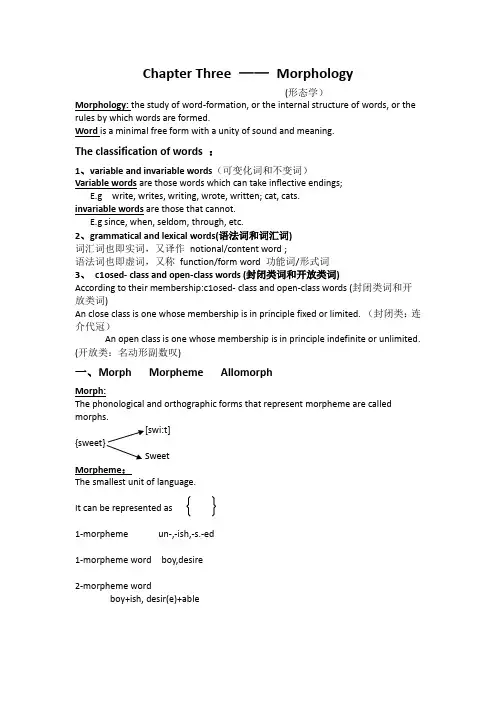
Chapter Three ——Morphology(形态学)Morphology: the study of word-formation, or the internal structure of words, or the rules by which words are formed.Word is a minimal free form with a unity of sound and meaning.The classification of words :1、variableand invariable words(可变化词和不变词)Variable words are those words which can take inflective endings;E.g write, writes, writing, wrote, written; cat, cats.invariable words are those that cannot.E.g since, when, seldom, through, etc.2、grammatical and lexical words(语法词和词汇词)词汇词也即实词,又译作notional/content word ;语法词也即虚词,又称function/form word 功能词/形式词3、c1osed- class and open-class words (封闭类词和开放类词)According to their membership:c1osed- class and open-class words (封闭类词和开放类词)An close class is one whose membership is in principle fixed or limited. (封闭类:连介代冠)An open class is one whose membership is in principle indefinite or unlimited. (开放类:名动形副数叹)一、Morph Morpheme AllomorphMorph:The phonological and orthographic forms that represent morpheme are called morphs.[swi:t]{sweet}SweetMorpheme:The smallest unit of language.It can be represented as1-morpheme un-,-ish,-s.-ed1-morpheme word boy,desire2-morpheme wordboy+ish, desir(e)+ableAllomorphA morpheme may be represented by different forms, called allomorphs.im possible{in} in convenientir regular tax.il logical-s [-s] book books{plural} -es [-iz] box boxes-i [-ai] mouse miceConclusion:All the allomorphs should have the same meaning.All the allomorphs should be in complementary distribution.The allomorphs with the same meaning should function the same in the language grammar structure.二、Classification of morpheme1、Free vs. Bound morphemesFree morphemes: those that may constitute words by themselves,e.g. boy, girl, table, nation.Bound morphemes: those that cannot occur alone,e.g. -s, -ed, dis-, un-.Root: the base form of a word that cannot be further analyzed without total loss of identity, i.e. it is that part of the word left when all the affixes are removed.e.g. Dislike, impolite, production,Membership, carelessnessfriend as in unfriendliness.Root may befree: those that can stand by themselves,e.g. black+board; nation+-al; orbound: those that cannot stand by themselves,e.g. -ceive in receive, perceive, conceive.Affix: the type of formative that can be used only when added to another morpheme. Normally divided intoprefix (dis-, un-) andsuffix (-en, -ify).Base: a morpheme to which an affix is added,e.g.friend root > basefriendly root/base + suffix > baseunfriendly prefix + base > baseStem: a morpheme or combination of morphemes to which an inflectional affix may be added,e.g. friend+-s;friendship swrite+-ing,possibility+-es.Note:A stem can be equivalent to a root.A stem may contain a root and aderivational affix.2、Derivational vs Inflectional morphemeInflection indicates:case and number of nouns,tense and aspect of verbs,degree of adjectives or adverbs.Derivation: combination of a base and an affix to form a new word, e.g. friend+-ly > friendly.三、Word-formationCompoundingAffixationOther formation1、CompoundingTwo or more free roots combine to make a new word.✧Noun compounds: daybreak, playboy, haircut, windmill✧Verb compounds: brainstorm, lipread, babysit✧Adjective compounds: gray-haired, insect-eating, dutyfree✧Preposition compounds: into, throughoutEndocentric& exocentricEndocentric: one element serves as the head, the relationship of “a kind of”; e.g. self-control: a kind of controlarmchair: a kind of chairExocentric: there is no head, so not a relationship of “a kind of something”, e.g. scarecrow: not a kind of crowbreakneck: not a kind of neckWritten forms of compoundsSolid: blackboard, teapot, bodyguardHyphenated: wedding-ring, wave-lengthOpen: coffee table, washing machineFree variation:businessman, business-man, business manwinebottle, wine-bottle, wine bottleno one, no-one, noone2、Affixation✧Nominal forms: boys, boy’s✧Verb forms: wants, wanted, wanting✧Adjective/adverb forms: smaller, smallest3、DerivationClass-changing:✧N>V: lengthen, hospitalize, discard✧N>A: friendly, delightful, speechless✧V>N: worker, employee, inhabitant✧V>A: acceptable, adorable✧A>N: rapidness, rapidity✧A>V: deafen, sweeten✧Adj>Adv: exactly, quickly4、Other formations:1)Blendingtransfer+resistor>transistorsmoke+fog>smog2)Acronym①AIDS, Aids: Acquired Immune Deficiency Syndrome②ASAP: as soon as possible3)Abbreviation/InitialismAI: artificial intelligencea.s.a.p.: as soon as possibleECU: European Currency Unit4)ClippingBack-clippings: ad(vertisement), chimp(anzee), deli(catessen), exam(ination), hippo(potamus), lab(oratory), piano(forte), reg(ulation)sFore-clippings: (ham)burger, (omni)bus, (violin)cello, (heli)copter, (alli)gator, (tele)phone, (earth)quakeFore-and-aft clippings: (de)tec(tive)5)Back-formationdiagnose < diagnosisenthuse < enthusiasmlaze < lazy6)Invention/CoinageMostly brand names:Kodak, Coke, nylon, Band-aid, Xerox, LycraCoca-cola, Orlon and Dacron7)BorrowingFrench: administration, parliament, public, court, crime, judge, army, enemy, Greek: catastrophe, cosmos, criterion, idiosyncrasySpanish and Portuguese: banana, barbecue, cafeteria, cargo, chocolate,8)Conversion 转换e.g. to butter the bread, take a look, empty a box, up the price9)Eponymsare words that originate from proper names of individuals or places.e.g. Sandwich (originating from the fourth Earl of Sandwich, who put his food between two slices of bread so that he could eat while gambling)ExerciseI. Decide whether each of the following statements is true or false.1. A morpheme must convey a lexical meaning.2. All words can be said to contain a root morpheme.3. Free morphemes can be further classified into inflectional and derivational morphemes.4. All words have morphs but not necessarily allomorphs.5. The word “modernizations”is made up of three morphemes.6. Derivational morphemes never change the class of the words to which they are attached.II. Fill in each of the following blanks with a proper word.Morphology is a branch of grammar which studies the ___ ___ of words and the____ by which words are formed.[-t], [-d], and [-id] are ___of the morpheme –ed.“Careless”is the __ of the word “carelessness”.__ affixes,__affixes, and __roots are all bound morphemes.III. Questions1. Analyze and then tell how many morphemes each of the following words contain. unselfishness, justifiable, sporting2. What constitutes the internal structure of words?3. List the allomorphs of the morpheme plural.。
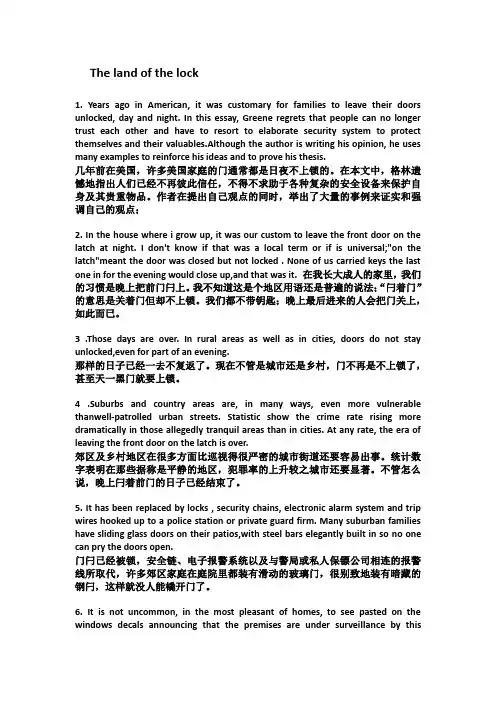
The land of the lock1. Years ago in American, it was customary for families to leave their doors unlocked, day and night. In this essay, Greene regrets that people can no longer trust each other and have to resort to elaborate security system to protect themselves and their valuables.Although the author is writing his opinion, he uses many examples to reinforce his ideas and to prove his thesis.几年前在美国,许多美国家庭的门通常都是日夜不上锁的。
在本文中,格林遗憾地指出人们已经不再彼此信任,不得不求助于各种复杂的安全设备来保护自身及其贵重物品。
作者在提出自己观点的同时,举出了大量的事例来证实和强调自己的观点;2. In the house where i grow up, it was our custom to leave the front door on the latch at night. I don't know if that was a local term or if is universal;"on the latch"meant the door was closed but not locked . None of us carried keys the last one in for the evening would close up,and that was it. 在我长大成人的家里,我们的习惯是晚上把前门闩上。
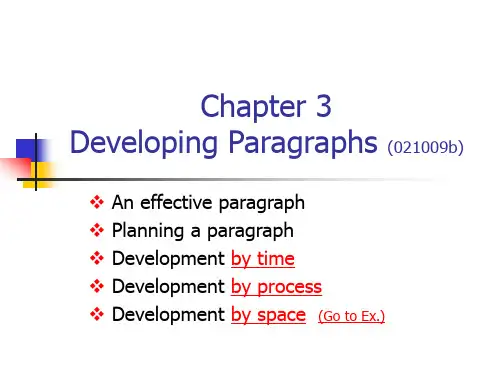
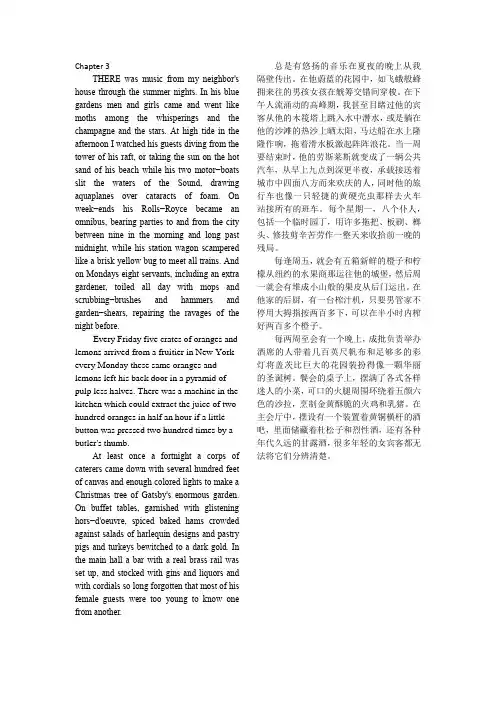
Chapter 3THERE was music from my neighbor's house through the summer nights. In his blue gardens men and girls came and went like moths among the whisperings and the champagne and the stars. At high tide in the afternoon I watched his guests diving from the tower of his raft, or taking the sun on the hot sand of his beach while his two motor−boats slit the waters of the Sound, drawing aquaplanes over cataracts of foam. On week−ends his Rolls−Royce became an omnibus, bearing parties to and from the city between nine in the morning and long past midnight, while his station wagon scampered like a brisk yellow bug to meet all trains. And on Mondays eight servants, including an extra gardener, toiled all day with mops and scrubbing−brushes and hammers and garden−shears, repairing the ravages of the night before.Every Friday five crates of oranges and lemons arrived from a fruitier in New York every Monday these same oranges and lemons left his back door in a pyramid of pulp less halves. There was a machine in the kitchen which could extract the juice of two hundred oranges in half an hour if a little button was pressed two hundred times by a butler's thumb.At least once a fortnight a corps of caterers came down with several hundred feet of canvas and enough colored lights to make a Christmas tree of Gatsby's enormous garden. On buffet tables, garnished with glistening hors−d'oeuvre, spiced baked hams crowded against salads of harlequin designs and pastry pigs and turkeys bewitched to a dark gold. In the main hall a bar with a real brass rail was set up, and stocked with gins and liquors and with cordials so long forgotten that most of his female guests were too young to know one from another.总是有悠扬的音乐在夏夜的晚上从我隔壁传出。

Lesson 1Wild1.adj. wild animals or plants live or grow in natural surroundings and are not taken care of by people. (动物或植物) 野生的例:We saw two more wild cats creeping toward us in the darkness.我们看见还有两只野猫在黑暗中向我们爬来。
2.adj. wild land is natural and is not used by people. 荒芜的例:...a wild area of woods and lakes.…一片荒芜的森林和湖泊区域。
3.adj. wild is used to describe the weather or the sea when it is stormy. (天气或海面) 狂风暴雨的例:The wild weather did not deter some people from taking an unseasonable dip in the sea.狂风暴雨的天气并没有使一些不合时宜地到海里游泳的人却步。
4.adj. Wild behaviour is uncontrolled, excited, or energetic. (行为) 狂热的例:The children are wild with joy.孩子们欣喜若狂.5.adj. If you describe someone or their behaviour as wild, you mean that they behave in a very uncontrolled way. (指人或其行为) 疯狂的例:The house is in a mess after a wild party.一次疯狂的聚会之后,房子里一片狼藉。
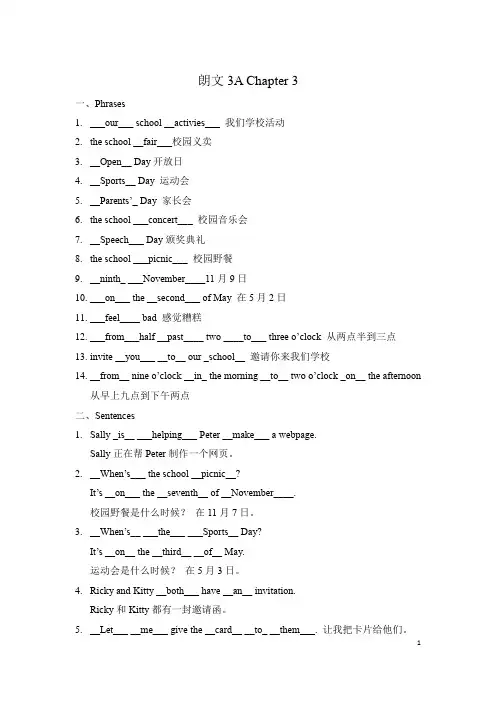
朗文3A Chapter 3一、Phrases1.___our___ school __activies___ 我们学校活动2.the school __fair___校园义卖3.__Open__ Day开放日4.__Sports__ Day 运动会5.__Parents’_ Day 家长会6.the school ___concert___ 校园音乐会7.__Speech___ Day颁奖典礼8.the school ___picnic___ 校园野餐9.__ninth_ ___November____11月9日10.___on___ the __second___ of May 在5月2日11.___feel____ bad 感觉糟糕12.___from___half __past____ two ____to___ three o’clock 从两点半到三点13.invite __you___ __to__ our _school__ 邀请你来我们学校14.__from__ nine o’clock __in_ the morning __to__ two o’clock _on__ the afternoon从早上九点到下午两点二、Sentences1.Sally _is__ ___helping___ Peter __make___ a webpage.Sally正在帮Peter制作一个网页。
2.__When’s___ the school __picnic__?It’s __on___ the __seventh__ of __November____.校园野餐是什么时候?在11月7日。
3.__When’s__ ___the___ ___Sports__ Day?It’s __on__ the __third__ __of__ May.运动会是什么时候?在5月3日。
4.Ricky and Kitty __both___ have __an__ invitation.Ricky和Kitty都有一封邀请函。
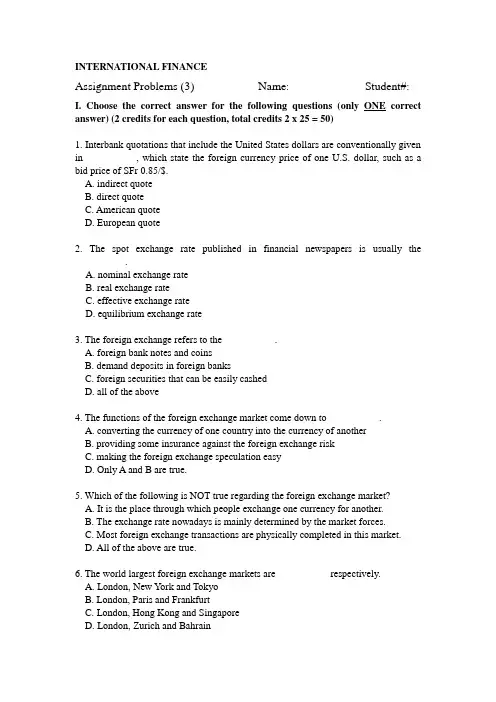
INTERNATIONAL FINANCEAssignment Problems (3) Name: Student#: I. Choose the correct answer for the following questions (only ONE correct answer) (2 credits for each question, total credits 2 x 25 = 50)1. Interbank quotations that include the United States dollars are conventionally given in __________, which state the foreign currency price of one U.S. dollar, such as a bid price of SFr 0.85/$.A. indirect quoteB. direct quoteC. American quoteD. European quote2. The spot exchange rate published in financial newspapers is usually the __________.A. nominal exchange rateB. real exchange rateC. effective exchange rateD. equilibrium exchange rate3. The foreign exchange refers to the __________.A. foreign bank notes and coinsB. demand deposits in foreign banksC. foreign securities that can be easily cashedD. all of the above4. The functions of the foreign exchange market come down to __________.A. converting the currency of one country into the currency of anotherB. providing some insurance against the foreign exchange riskC. making the foreign exchange speculation easyD. Only A and B are true.5. Which of the following is NOT true regarding the foreign exchange market?A. It is the place through which people exchange one currency for another.B. The exchange rate nowadays is mainly determined by the market forces.C. Most foreign exchange transactions are physically completed in this market.D. All of the above are true.6. The world largest foreign exchange markets are __________ respectively.A. London, New York and TokyoB. London, Paris and FrankfurtC. London, Hong Kong and SingaporeD. London, Zurich and Bahrain7. The foreign exchange market is NOT efficient because __________.A. monetary authorities dominate the foreign exchange market and everybody knows that by definition, central banks are inefficientB. commercial banks and other participants of the market do not compete with one another due to the fact that transaction takes place around the world and not in a single centralized locationC. foreign exchange dealers have different prices such as bid and ask pricesD. None of the reasons listed are correct because the foreign exchange market is an efficient market8. __________ earn a profit by a bid-ask spread on currencies they buy and sell. __________ on the other hand, earn a profit by bringing together buyers and sellers of foreign exchanges and earning a commission on each sale and purchase.A. Foreign exchange brokers; foreign exchange dealersB. Foreign exchange dealers; foreign exchange brokersC. arbitragers; speculatorsD. commercial banks; central banks9. Most foreign exchange transactions are through the U.S. dollars. If the transaction is expressed as the currencies per dollar, this is known as __________ whereas __________ are expressed as dollars per currency.A. direct quote; indirect quoteB. indirect quote; direct quoteC. European quote; American quoteD. American quote, European quote10. From the viewpoint of a Japanese investor, which of the following would be a direct quote?A. SFr 1.25/€B. $1.55/₤C. ¥ 110/€D. €0.0091/ ¥11. Which of the following is true about the foreign exchange market?A. It is a global network of banks, brokers, and foreign exchange dealers connected by electronic communications system.B. The foreign exchange market is usually located in a particular place.C. The foreign exchange rates are usually determined by the related monetary authorities.D. The main participants in this market are currency speculators from different countries.12. The extent to which the income from individual transactions is affected by fluctuations in foreign exchange values is considered to be _________.A. Translation exposureB. economic exposureC. transaction exposureD. accounting exposure13. Which of the following exchange rates is adjusted for price changes?A. nominal exchange rateB. real exchange rateC. effective exchange rateD. equilibrium exchange rate14. Suppose the exchange rate of the RMB versus U.S. dollar is ¥6.8523/$ now. If the RMB were to undergo a 10% depreciation, the new exchange rate in terms of ¥/$ would be:A. 6.1671B. 7.5375C. 6.9238D. 7.613515. At least in a U.S. MNC’s financial accounting statement, if the value of the euro depreciates rapidly against that of the dollar over a year, this would reduce the dollar value of the euro profit made by the European subsidiary. This is a typical __________.A. transaction exposureB. translation exposureC. economic exposureD. operating exposure16. A Japanese-based firm expects to receive pound-payment in 6 months. The company has a (an) __________.A. economic exposureB. accounting exposureC. long position in sterlingD. short position in sterling17 The exposure to foreign exchange risk known as Translation Exposure may be defined as __________.A. change in reported owner’s equity in consolidated financial statements caused by a change in exchange ratesB. the impact of settling outstanding obligations entered into before change in exchange rates but to be settled after change in exchange ratesC. the change in expected future cash flows arising from an unexpected change in exchange ratesD. All of the above18 When a firm deals with foreign trade or investment, it usually has foreign exchange risk exposure. So if an American firm expects to receive a dollar-paymentfrom a Chinese company in the next 30 days, the U.S. firm has the possible __________.A. economic exposureB. transaction exposureC. translation exposureD. none of the above19. In order to avoid the possible loss because of the exchange rate fluctuations, a firm that has a __________ position in foreign exchanges can __________ that position in the forward market.A. short; sellB. long; sellC. long; buyD. none of the above20. A forward contract to deliver Japanese yens for Swiss francs could be described either as __________ or __________,A. selling yens forward; buying francs forwardB. buying francs forward; buying yens forwardC. selling yens forward; selling francs forwardD. selling francs forward; buying yens forward21. Dollars are trading at S0SFr/$=SFr0.7465/$ in the spot market. The 90-day forward rate is F1SFr/$=SFr0.7432/$. So the forward __________ on the dollar in basis points is __________:A. discount, 0.0033B. discount, 33C. premium, 0.0033D. premium, 3322. If the spot rate is $1.35/€, 3-month forward rate is $1.36/€, which of the following is NOT true?A. euro is at forward premium by 100 points.B. dollar is at forward discount by 100 points.C. dollar is at forward discount by 55 points.D. euro is at forward premium by 2.96% p.a.23. If the spot C$/$ rate is 1.0305/15, forward dollar is 25/30 premium, the outright forward quote in American term should be __________.A. 1.0330 – 1.0345B. 1.0280 – 1.0285C. 0.9681 – 0.9667D. 0.9728 – 0.972324. If the spot C$/$ rate is 1.0305/15, forward dollar is 25/30 premium, the $/C$ forward quote in terms of points should be __________.A. 30/25B. 25/30C. – (23/28)D. – (28/23)25. The current U.S. dollar exchange rate is ¥85/$. If the 90-day forward dollar rate is ¥90/$, then the yen is selling at a per annum __________ of __________.A. premium; 5.88%B. discount; 5.56%C. premium; 23.52%D. discount; 22.23%II. ProblemsQuestions 1 through 10 are based on the information presented in Table 3.1. (2 credits for each question, total credits 2 x 10 = 20)Table 3.1Country Exchange rate Exchange rate CPI V olume of Volume of (2008) (2009) (2008) exports to U.S imports from U.S. Germany €0.75/$ €0.70/$ 102.5 $200m $350m Mexico Mex$11.8/$ Mex$12.20/$ 110.5 $120m $240mU.S. 105.31. The real exchange rate of the dollar against the euro in 2009 was __________.2. The real exchange rate of the dollar against the peso in 2009 was __________.3. The dollar was __________ against the euro in nominal term by __________.A. appreciated; 6.67%B. depreciated; 6.67%C. appreciated; 7.14%D depreciated; 7.14%4. The Mexican peso was __________ against the dollar in nominal term by __________.A. appreciated; 3.39%B. depreciated; 3.39%C. appreciated; 3.28%D. depreciated; 3.28%5. The volume of the German foreign trade with the U.S. was __________.6. The volume of the Mexican foreign trade with the U.S. was __________.7. Assume the U.S. trades only with the Germany and Mexico. Now if we want to calculate the dollar effective exchange rate in 2009 against a basket of currencies of euro and Mexican peso, the weight assigned to the euro should be __________.8. The weight assigned to the peso should be __________.9. Assume the 2008 is the base year. The dollar effective exchange rate in 2009 was __________.10. Was the dollar generally stronger or weaker in 2009 according to your calculation?11. The following exchange rates are available to you.Fuji Bank ¥80.00/$United Bank of Switzerland SFr0.8900/$Deutsche Bank ¥95.00/SFrAssume you have an initial SFr10 million. Can you make a profit via triangular arbitrage? If so, show steps and calculate the amount of profit in Swiss francs. (8 credits)12. If the dollar appreciates 1000% against the ruble, by what percentage does the ruble depreciate against the dollar? (5 credits)13. As a percentage of an arbitrary starting amount, about how large would transactions costs have to be to make arbitrage between the exchange rates S SFr/$= SFr1.7223/$, S$/¥= $0.009711/¥, and S¥/SFr = ¥61.740/SFr unprofitable? Explain. (7 credits14. You are given the following exchange rates:S¥/A$ = 67.05 – 68.75S£/A$ = 0.3590 – 0.3670Calculate the bid and ask rate of S¥/£: (5 credits)15. Suppose the spot quotation on the Swiss franc (CHF) in New York is USD0.9442 –52 and the spot quotation on the Euro (EUR) is USD1.3460 –68. Compute the percentage bid-ask spreads on the CHF/EUR quote. ( 5 credits)Answers to Assignment Problems (3)Part II1. 0.70 x (105.3/102.5) = 0.7 x 1.0273 = 0.71912. 12.2 x (105.3/110.5) = 12.2 x .9529 = 11.62593. B (0.7 /.75) – 1 = -6.67%4. D (1/12.2)/(1/11.8) – 1 = -3.28%5. 5506. 3607. 550/910 = 60.44%8. 360/910 = 39.569. (0.70/0.75)(60.44%) + (12.2/11.8)(39.56%) = .5641 + 0.4090 = .9731 = 97.31%10. weaker, because dollar depreciated by 2.69%.11. Since S¥/$S$/SFr S SFr/¥= 80 x 1/0.8900 x 1/95.00 = 0.946186 < 1, there is an arbitrage opportunity.Steps:①Buy ¥ from Deutsche Bank, SFr10 million x 95.00 = ¥950 million②Buy $from Fuji Bank, $950 m / 80.00 = $11.875 m③Buy SFr from UBS, $11.875 x 0.8900 = SFr10.56875 mProfit (ignoring transaction fees):SFr10.56875 – SFr10 = 0.56875 million = 568,75012. (x – 1) = 1000%; 1/11 – 1 = 90.9%13. S SFr/$ S$/¥S¥/SFr = SFr1.7223/$ x $0.009711/¥ x ¥61.740/SFr = 1.0326If transaction costs exceed $0.0326 (3.26%), the arbitrage is unprofitable.14. Given: S¥/A$ = 67.05 – 68.75S£/A$ = 0.3590 – 0.3670So, S¥/₤ = 67.05/0.3670 = 182.70 (bid)S£/₤ = 68.75/0.3590 = 191.50 (ask)15. Given: USD0.9442 – 52/SFrUSD1.3460 – 68/SFrSo, S SRr/€ = 1.3460/0.9452 =1.424 (bid)S SFr/€ = 1.3468/0.9442 = 1.4264 (ask)。
Chapter 3答案Morphology1. Define the following terms briefly.(1)morphology: the study of the structure of words.(2)morpheme: the smallest unit of language that carries meaning or serves a grammatical function.(3)free morpheme: a morpheme that can stand alone as a word.(4)bound morpheme: a morpheme that can not stand alone as a word, e.g. -ment (as in establishment), and -er (as in painter).(5)morph: the smallest meaningful phonetic segments of an utterance on the level of parole.(6)allomorph: a phonetic form in which a morpheme is realized, e.g. -s, -es, and -en are all allomorphs (in writing) of the plural morpheme. (7)derivation: the formation of new words by adding affixes to other words or morphemes in morphology and word formation.(8)clipping: the process by which parts of a word of more than one syllable have been cut off, and reduced to a shorter form.(9)acronym: words which are composed of the first letter of a series of words and are pronounced as single words. Examples: NATO, radar and yuppy.(10) initialism: Some new words are composed of the first letters of a series of words and pronounced by saying each letter in them. Such words are calledinitialism.(11) blending: A single new word can be formed by combining two separate forms. Typically, blending is finished by taking only the beginning of one word and joining it to the end of another word. For example, brunch isformed by the shortened forms of breakfast and lunch.(12) root: the morpheme that remains when all affixes are stripped from a complex word, e.g. system from un- + system + atic + ally. (13) stem: the base to which one or more affixes are attached to create a more complex form that may be another stem or a word. For example, book is the stem of bookish.(14) prefix: Affixes can be joined to the beginning of the root or stem, in which case they are called prefixes.(15) suffix: Affixes can be joined to the end of the root or stem, in which case they are called suffixes.2. (3), (5), (7)3. (1) simple: fly tree suite(2)bound morpheme root fly / flyreuse re-usespiteful -ful spite preplan pre-plandesks -s desk triumphed -ed triumph suite / suiteoptionality -ality option untie un-tiedelight de-lightfastest -est fastprettier -ier prettytree / treejustly -ly justdeform de-form mistreat mis-treat dislike dis-like payment -ment pay disobey dis-obey premature pre-mature4.(1) Column I: ablaut (vowel modification)Column II: suppletionColumn III: stress modification(2)The process in the Column I is finished by changing the vowel of each word,while in Column II, the process is finished by changing vowel and consonant of each word.(3)Column I: awake/awoke bear/bore arise/aroseblow/blew bite/bit hide/hidlie/lay know/knew foot/feetgoose/geese tooth/teeth louse/liceColumn II: bad/worse are/were many/moreColumn III: #combine/com#bine #compress/com#press#conduct/con#duct #insert/in#sert#insult/in#sult #intern/in#tern5. (1) Omitted.(2)Other examples:#rerun (n.) – re#run (v.) #contrast (n.) – con#trast (v.)#convert (n.) – con#vert (v.) #desert (n.) – de#sert (v.)#export (n.) – ex#port (v.) #increase (n.) – in#crease (v.)#conduct (n.) – con#duct (v.) #object (n.) – ob#ject (v.)#content (n.) – con#tent (v.) #protest (n.) – pro#test (v.)#insult (n.) – in#sult (v.) #produce (n.) – pro#duce (v.)When a word belongs to different word classes, the stress of the word will be sometimes placed on different syllables. When all the words above are stressed on the first syllables, they are nouns, but if they have the second syllables stressed, the words become verbs.6. (1) It means “the inhabitant of ”.(2)It means “the person who does”.(3)The morphological rule working here is “n. + -er ––n.”, and the last phoneme of the noun, which the suffix -er is added to, should be a consonant.(4)The rule in (3) doesn’t work in the word discoverer because the last phoneme of discoverer is a vowel /2/.7. (1) inflection (2) derivation (3) inflection (4) inflection (5) derivation。
Chapter 3 Equivalence above word level3.1. CollocationWhen we discussed lexical meaning in Chapter 2, we made a brief reference to collocation under presupposed meaning and defined it as:①Semantically arbitrary restriction which do not follow logically from the propositional meaning of a word②To think of collocation in terms of the tendency of certain words to co-occur regularly ina given languageThe patterns of collocation are largely arbitrary and independent of meaning.Differences in collocational patterning among languages are not just a question of using, say,a different verb with a given noun; they can involve totally different ways of portraying an event.3.1.1.Collocational range and collocational markednessRange here refers to the set of collocates, which are typically associated with the word in question.Two main factors can influence the collocational range of an item: (1) its level of specificity;(2) the number of senses it has.It is the collocational patterning of a word that determines its different senses. Either way, it is clear that there is a strong relationship between the number of senses a word has and its collocational range.Collocational ranges are not fixed. Words attract new collocates all the time: they do so naturally, through processes of analogy, or because speakers create unusual collocations on purpose.A marked collocation is an unusual combination of words, one that challenges our expectations as hearers or readers.To sum up, we create new collocations all the time, either by extending an existing range or by deliberately putting together words from different or opposing ranges.3.1.2. Collocation and registerRegister-specific collocations are not simply the set of terms that go with a discipline. They extend far beyond the list of terms that one normally finds in specialized dictionaries and glossaries.3.1.3. Collocational meaningCollocational meaning depends largely on its pattern of collocation and is not something that the word possesses in isolation.3.1.4. Some collocation-related pitfalls and problems in translation3.1.4.1. The engrossing effect of source text patterningConfusing source and target patterns is a pitfall that can easily be avoided once the translator is alerted to the potential influence that the collocational patterning of the source text can have on him or her.A good method of detaching oneself from the source text is to put draft translation aside fora few hours.3.1.4.2. Misinterpreting the meaning of a source-language collocation3.1.4.3. The tension between accuracy and naturalness3.1.4.4. Culture-specific collocations3.1.4.5. Marked collocation in the source text3.2. Idioms and fixed expressions3.2.1. Idioms, fixed expressions and the direction of translation"N ative knowledge" is defined as the ability to speak and write a language so fluently that the expression of thought is structurally, grammatically and idiomatically correct.The main problem that idiomatic and fixed expressions pose in translation relates to two main areas:①The ability to recognize and interpret an idiom correctly②The difficulties involved in rendering the various aspects of meaning that an idiom or a fixed expression conveys into the target language.3.2.2. The interpretation of idioms①Some idioms are misleading; they seem transparent because they offer a reasonable literal interpretation and their idiomatic meanings are not necessarily signalled in the surrounding text.②An idiom in the source language may have a very close counterpart in the target language which looks similar on the surface but has a totally or partially different meaning.3.2.3. The translation of idioms: difficultiesAn idiom or a fixed expression may have no equivalent in the target language:①Express a given meaning by means of a single word②Express it by means of a transparent fixed expression③Express it by means of an idiomAn idiom or fixed expression may have a similar counterpart in the target language, but its context of use may be different; the two expressions may have different connotations or they may not be pragmatically transferable.An idiom may be used in the source text in both its literal and idiomatic senses at the same time. The very convention of using idioms in written discourse, the contexts in which they can be used, and their frequency of use may be different in the source and target languages.3.2.4. The translation of idioms: strategies3.2.4.1. Using an idiom of similar meaning and formIt is to use an idiom in the target language which conveys roughly the same meaning as that of the source-language idiom and, in addition, consists of equivalent lexical items.3.2.4.2. Using an idiom of similar meaning but dissimilar form3.2.4.3. T ranslation by paraphrase3.2.4.4. T ranslation by omission。